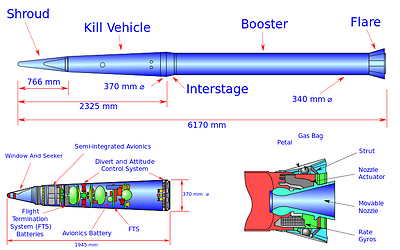
Top general: US considering possible Middle East missile defense
US military officials have previously raised concerns about Iran's development of longer-range missiles that could reach Israel and potentially Europe.
The US military is considering sending its THAAD missile defense system to the Middle East, a senior US Army general said Wednesday, citing what he called an urgent need to respond to foes with missile systems and the will to use them.
General Vincent Brooks, head of US Army Pacific Command, said no decisions had been made about deploying a US-owned Terminal High Altitude Area Defense (THAAD) battery in the Middle East or South Korea, another region where he saw an urgent need given the threat posed by North Korea.
Related articles:
- Mixed report for Israel's missile defense system
"The need is there in ... those two places, urgently, because we have adversaries who have capability and they have demonstrated that they are willing to use it," Brooks told Reuters in an interview.
Brooks did not name Iran, but US military officials have raised concerns in the past about Iran's development of longer-range missiles that could reach Israel and potentially Europe.
The US military must weigh its options, given the high cost involved in deploying the THAAD weapon system, built by Lockheed Martin Corp, Brooks said. He said the US military also continued to explore options for lower-cost systems to defend against lesser threats, but gave no details.
The Army is preparing to swap out a THAAD battery that has been operating in Guam for about a year. It has four active THAAD batteries, with a fifth to start training this year.
"They have to decide where the need is greatest," said one congressional aide said. "The question is, what does the Central Command commander need to protect US forces."
The commander of US troops stationed in South Korea last June said he had proposed deploying THAAD missiles to South Korea to counter the growing threat of nuclear-armed North Korea's weapons capabilities.
Critics say such a deployment could inflame tensions with China and Russia as they see the move as a threat to their security interests.
US Deputy Secretary of State Antony Blinken said in Seoul last month that a THAAD deployment in South Korea was not under active discussion.
Lockheed will make initial deliveries of a THAAD system bought by the United Arab Emirates under a $1.96 billion sale first announced in December 2011, but it will take a year or more until the system is fully operational.
Lockheed hopes to finalize a similar deal with Qatar over the next two years, and Saudi Arabia is also considering a possible purchase.
Brooks said the US military remained in dialogue with various Asian countries about how they could take responsibility for self-defense, and how any capabilities could be networked together to help defend allies elsewhere in the region.
Sources familiar with the THAAD system said they did not believe a deployment to the Middle East was imminent.
Riki Ellison, founder of the nonprofit Missile Defense Advocacy Alliance, said putting a THAAD system in the Middle East would help cover potential gaps in the existing coverage of the area such as provided by the Aegis system on U.S. destroyers and Patriot missile batteries.
Ultimately, he said, a decision to station a THAAD system in the Middle East would be a "political chess move" in the current US talks with Iran over ending its nuclear weapons program.











